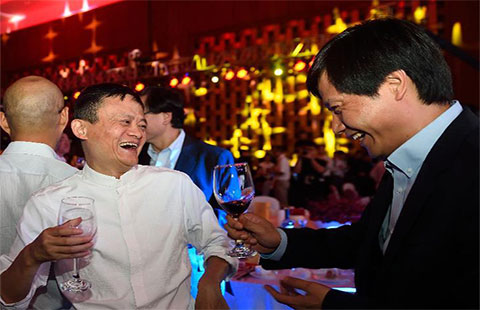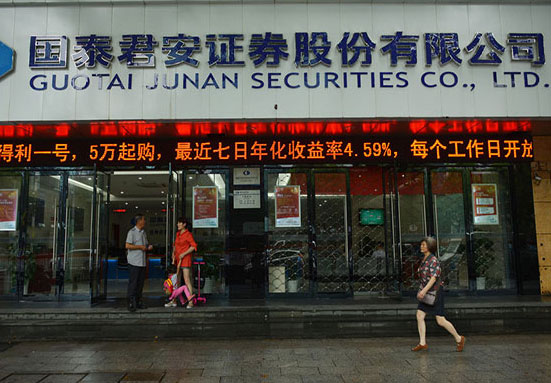

The development of China's private sector is likely to witness a breakthrough in 2012, as the authorities consolidate rules to lower entrance limits and become more reliant on the private sector against the backdrop of an economic slowdown, said analysts and executives.
Uncertainty over external demand and slower economic growth in the world's second-largest economy will make the government rely more on the growth momentum generated by the private sector, said Bao Yujun, president of All-China Private Enterprise Federation, on Sunday at the Boao Forum for Asia.
He said the official target of a 16 percent increase this year in fixed asset investment indicates total investment of 36 trillion yuan ($5.4 trillion).
"But the central government could only channel about 402 billion yuan, which means more room is available for private investment," he said.
However, China's private enterprises face increasing pressure from price hikes in raw materials, rising labor costs, financing difficulties, and a heavy tax burden, he added.
The HSBC Purchasing Managers' Index, an indicator reflecting operating conditions in the manufacturing economy, especially the private sector, fell for its fifth successive month to 48.3 in March. Figures below 50 signal contraction.
"In addition, the invisible 'glass gate' encountered by entrepreneurs when entering some sectors is still firmly closed. The New 36 Clauses, targeted at eliminating policy barriers in the private sector, haven't been well-implemented in the two years since they issued."
The New 36 Clauses refer to policies published in May 2010 to encourage and guide private investment. The terms were a further refinement of policies published in 2005.
Premier Wen Jiabao vowed in February that detailed rules on the implementation of the "New 36 Clauses" will come out in the first half of this year.
Without specific policies on the rules, private capital will still meet an invisible "glass gate" when entering into sectors that have yet open to private enterprises, Wen said.
Rosa Yang, a Shanghai-based partner at Deloitte China, said that even if more specific rules are issued to allow private players to enter key areas such as railways, municipal projects, energy, finance, education, telecommunications and healthcare, it's difficult to say how much private enterprises would be able to benefit.
"We will see how the detailed rules are carried out after their publication. And it also depends on how simple and transparent government can be when making approval decisions," Yang said.
Some cash-rich entrepreneurs in eastern Zhejiang province, the powerhouse of China's private companies, have shown their eagerness to participate in monopolized sectors, clamoring for concrete details on the New 36 Clauses in order to clear the final entry barriers.
"We have abundant cash and are willing to participate in sectors such as oil exploration," said Zong Qinghou, chairman of the beverage maker Hangzhou Wahaha Group. Zong was listed by the Hurun Research this year as China's richest man. He added that private enterprises, unlike State-owned behemoths, are more flexible and familiar with market rules that will bring more vigor to the industry.
It's impossible for private capital to get into highly monopolized industries if there are no feasible policies, said Zhuang Qichuan, president of the toiletry products producer Zhejiang Nice Group.
However, some State-owned companies assert that the most highly consolidated industries are critical to China's security and therefore should be in the hands of big companies.
Given State-owned enterprises' long experience in their respective industries, private companies may find it hard to compete with them and may suffer losses, said Rong Guangdao, chairman of Sinopec Shanghai Petrochemical Company.
Guo Gengmao, governor of Henan province, said on Sunday that local governments are somewhat reluctant to welcome private players to some areas closely related to the public interest, because profit is always their top priority and they are less aware of their social responsibilities than their State-owned counterparts.
"For example, once a private heating company shut down the heating system it operated at a university because the latter could not pay their bills on time, but the anger of the students and teachers was directed at the local government - that kind of thing usually put us in dilemma."
Contact the writers at wangxiaotian@chinadaily.com.cn and zhouyan@chinadaily.com.cn
 Fishermen who clean enteromorpha
Fishermen who clean enteromorpha
 Govt Carries out conservation program in Tibet
Govt Carries out conservation program in Tibet
 Business giants celebrate the success of entrepreneurship
Business giants celebrate the success of entrepreneurship
 Top 10 Chinese businesswomen in 2015
Top 10 Chinese businesswomen in 2015
 Female robot sings in Shanghai
Female robot sings in Shanghai
 21st Lanzhou Investment and Trade Fair kicks off in Lanzhou
21st Lanzhou Investment and Trade Fair kicks off in Lanzhou
 Top 10 Chinese brokerage firms in H1 of 2015
Top 10 Chinese brokerage firms in H1 of 2015
 Fancy sculptures sparkle in Chongqing
Fancy sculptures sparkle in Chongqing